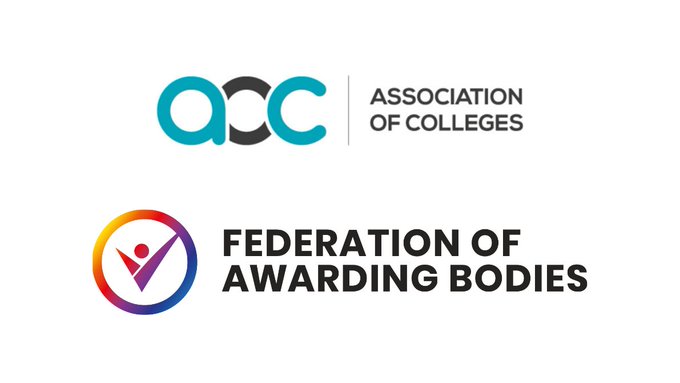Supporting students to achieve qualifications that recognise their hard work and enable them to progress

In a joint letter released today (Wednesday 08 April), @AoC_info and the Federation of @AwardingBodies have announced agreed principles to support the relationship between colleges and awarding organisations through the COVID-19 crisis.
At the heart of it is a joint commitment to support students to achieve qualifications that recognise their hard work and enable them to progress onto further learning and into work.
Their letter in full:
AoC and FAB have agreed some principles which will support the contractual relationships between colleges and awarding organisations in these exceptional times. We have the same unerring focus – to support students wherever possible to achieve the qualifications they are studying for in order to recognise their hard work and to enable them to progress in learning and into work.
Colleges and awarding organisations had been preparing routinely for the summer 2020 assessment series for many months but the pandemic and subsequent lockdown have changed everything. Awarding organisations are now working closely with regulators, DfE, the Federation of Awarding Bodies (FAB), JCQ, AoC and other sector representative organisations to find the most appropriate ways to award learners their qualifications despite the disruption caused by COVID-19. AoC and FAB agrees that the whole post-16 skills ecosystem needs to be supported at this time.
Details of a new teacher-led GCSE and A Level awarding process was announced last week and we expect an announcement soon on technical and vocational qualifications. In the meantime, awarding organisations are also gathering and analysing data to ensure that decisions can be implemented as swiftly as possible.
With the aim of supporting open and constructive relationships, AoC and FAB have agreed some key principles to guide colleges and awarding organisations:
- The number one priority is to protect the interests of students to have the opportunity to obtain the qualifications and assessments they have worked for.
- In order to achieve that, we need to protect the provider and awarding organisation post-16 skills ecosystem which supports learners. This includes organisations of all sizes which will face difficulties as a result of the crisis and some of which offer important ‘niche’ qualifications.
- We understand that there will be both savings and new costs associated with the processes this year and agree that any net savings should be passed on to the providers paying for the qualifications. Similarly, we call on regulators and government to recognise that there may also be some net additional costs placed on the awarding sector as a result of implementing an emergency regulatory framework designed to help learners progress. In all cases, open and independent verification of these calculations would aid transparency and trust.
- There is a shared interest in ensuring that both colleges and awarding organisations remain viable. In order to protect all parties, we suggest standard payment terms be extended to 90 days but that colleges who are in a position to make payments earlier should do so. We recognise that commercial relationships and decisions sit with awarding organisations and their customers.
We hope that these principles will guide the relationships between colleges and awarding organisations and help the sector navigate through the current crisis. Achieving that will help to ensure that students are appropriately rewarded for their hard work and offer an approach which allows for a sustainable future for both colleges and awarding organisations.
David Hughes CEO, Association of Colleges and Tom Bewick CEO, Federation of Awarding Bodies












Responses